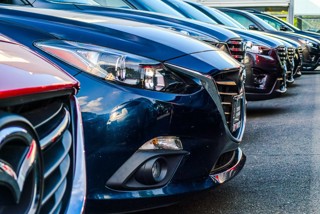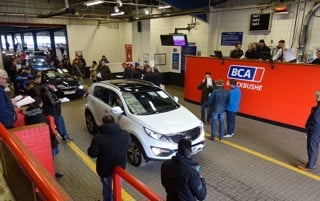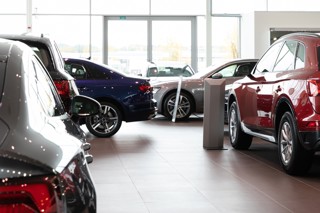Imagine having a dealership servicing a territory the size of Switzerland. That’s the reality for AM100 dealer group Macrae & Dick, whose showrooms in Inverness attract a customer base from across the Scottish Highlands and Islands.
♦ To see more images of Macrae & Dick's Inverness showrooms, click here
In addition to its vast size, the region has a population density of just 23 people per square mile, according to the 2011 Census. Compare that with Scotland’s highest-density region, Glasgow, which has 8,520 people per square mile.
Imagine having a dealership servicing a territory the size of Switzerland. That’s the reality for AM100 dealer group Macrae & Dick, whose showrooms in Inverness attract a customer base from across the Scottish Highlands and Islands.
♦ To see more images of Macrae & Dick's Inverness showrooms, click here
In addition to its vast size, the region has a population density of just 23 people per square mile, according to the 2011 Census. Compare that with Scotland’s highest-density region, Glasgow, which has 8,520 people per square mile.
The motor industry adage that a consumer is generally happy to travel up to an hour to buy their chosen car (and up to 20 minutes for servicing it) cannot hold true here. Managing director Andrew Grzesinski explained that for some of Macrae & Dick’s customers, changing their car has to be a 24-hour experience.
FACTFILE |
|||
|
Macrae & Dick is Scotland’s longest-established motor retailer. Owned largely by the Hamilton family, the business has expanded in recent decades and features in the AM100 ranking of the UK’s largest franchised dealer groups. The group employs 450 people and the franchises held are Ford (Inverness, Elgin, Perth, Stirling), Honda (Inverness, Aberdeen), Jaguar (Inverness), Land Rover (Inverness), BMW and Mini (Stirling), Mazda (Inverness) and Toyota (Inverness). It also has bodyshops in Inverness and Stirling, and four fast-fit centres under the Ford Rapid Fit programme. It is a resilient business, which remained profitable through the recent recession and it has kept its gearing below 4% ever since. Its 2013 turnover was a record £164 million, with pre-tax profits of £1.56m. For 2014, it predicts £180m in turnover and pre-tax profits of £2.4m. |
|||
|
Macrae & Dick won the 2014 AM Award for Excellence in Customer Service. |
|||
 |
|||
|
This profile of Macrae & Dick was the cover story of the December edition of AM - Automotive Management magazine. Read more here |
|||
“If a customer has got to come from the Islands, they’ve got to get a ferry, then drive across. They’ll usually stay overnight, and drive back the next day,” he said. Grzesinski’s Inverness dealerships help to arrange accommodation and have even occasionally delivered cars to customers’ homes in the Orkneys or Western Isles.
“Because of the drive times, every one of our used cars is prepared and ready to go.
“Because customers come from the far reaches, they’ll come to Inverness, they’ll do a deal on the car and they’ll drive it back so they don’t have to take a day or two days out to come and get it.
“So we have to make sure the car is prepared, that we’ve gathered as much information from the customer as possible and that our finance proposals are done as quickly as possible, so that they can take the car away.”
I put it to Grzesinski that this is similar to the motor retailing concept seen in many dealerships in America. He agreed, but emphasised that it is a process particular to Macrae & Dick’s sites in the north of Scotland. Other sites, such as at Perth and Stirling, don’t turn the sale around so quickly. However, this got him thinking.
“Maybe it’s one we should be doing at the other sites. It could be a strapline: ‘Come and deal on the day’,” he said.
To succeed with such a fast turnaround, Grzesinski has to be confident that his sales managers are good at appraising part-exchanges and creating fair and amicable transaction prices for customers. Part-exchanges are often a useful source of stock, but the dealer group also has staff attend vehicle auctions, even if they are a four-hour drive away.
Keeping stock control systems in-house
Sales managers use software that was developed in-house to control their stock holdings. It is up to them how they set their model mix in order to meet the next month’s budget, but the system shows them what is in stock, what part-exchanges will be available and what demonstrators they are due to de-fleet.
Systems and electronic support are a strong feature of this dealer group’s thinking. Grzesinski believes it will not be long before dealers will be able to value part-exchanges via the internet, perhaps facilitated by the customer providing a short video walkaround of their car.
Macrae & Dick developed its own database software over a two-year period. Grzesinski said this was in a response to the limitations of the group’s previous system. He said the new software, which became operational in the spring, gives the group “artificial intelligence” for the future.
“We have to look upon our database and be more informed about the customer and their buying patterns. We’re gathering more information about the customer than ever before.
“Now, because of the software we’re developing, we’re getting it right first time. We have something tailored to our business, giving efficiencies far superior to anything we’ve had before.
“For example, if somebody is coming in for an MoT or service, we have the information to re-market or prospect that customer from the service department. It’s in its infancy, but in a year’s time I’ll be able to say ‘this is how much a difference this has made’.”
Grzesinski said he sees a future in allowing the customer to qualify themselves on tablet computers. It isn’t a reality yet at Macrae & Dick, but he is convinced people are used to sharing their information and he sees it as being a more relaxed and more accurate way of gathering data.
The industry’s current process is more interested in gathering a customer’s information than letting them enjoy the car and the visit, and that risks “hacking people off” before they get to the good bits, he said.
“It’s back to looking at the process, just to make it better. It’s a worthwhile challenge to change the way that we do things.
“Clearly, the customer’s habits are changing. The way they source vehicles is continually going to be more technology-based. So dealer groups have to be aware and ensure we engage them with a modern process.”
Grzesinski acknowledges that it may be difficult to square creating a more relaxed process for the consumer with the pressures dealers come under from volume targets and
additional revenue streams. “If manufacturers want to improve the customer experience, they have to take cognisance of pushing the market and their products for registrations. Because they can’t have both. If it continues down the route of volume-related bonus, that will have an impact on the customer experience.”
The customer experience and business reputation is a critical concern for Grzesinski. He heads a dealer group brand that has been built over the past 136 years, since its first days of offering horses and carriages for hire. In its showrooms hang framed prints showing its founders Roderick Macrae and William Dick and activities from its history in transport and aviation.
Grzesinski is proud of the company’s heritage and educates new recruits about its history and values, but he’s just as keen to show that it has a modern approach to business. He sees the processes used in motor retail as still lagging behind modern consumer behaviour and believes salespeople need to be trained to engage with internet users. He accepts that the consumer comes better informed than ever before, and believes it is important that the salesperson understands and doesn’t look upon the customer’s own research as meaningless. Currently the sales staff at its BMW and Mini dealership deal with internet enquiries themselves, while online leads for other sites in the group are handled centrally.
The BMW dealership also recruited two ‘product geniuses’ following the German brand’s roll-out of the new showroom role.
“I’ve got a very open mind on it, because it just may be the thing that makes that change to the sales process, to the way we interact with the customer. It will be interesting to see how it works in practice.”
[page-break]“We work very hard at maintaining high levels of customer satisfaction, because we’ve identified that in this internet age it is more important than ever given that we’re seeing the customer less and less in the showroom.”
Nevertheless, Grzesinski suggests the industry suffers in the varied ways different manufacturer brands measure satisfaction. He suggested marking on the customer experience, scored 0-10, with a seven and above showing a good experience.
“If you have a good experience, not only are you satisfied, but it will lead to customer retention. And it will give you a bigger voice with the people you deal with singing your praises.”
The group has a central marketing team, which is involved in database, social media and all forms of advertising. For three years, Macrae & Dick has chosen internet advertising over newspapers, but the company sees its database as the real opportunity. Conquest business is important to grow revenues, but not at the expense of forgetting the existing customer base.
“Sometimes on my rounds I’ll meet customers and they’ll say ‘this is the 10th car’, and other times the father and grandfather will be in with the granddaughter to introduce us.”
The impact of the showroom environment
Asked what impact the showroom environment has on the customer experience (its large Inverness Ford dealership has been updated recently to the latest corporate identity and its Jaguar and Land Rover businesses are destined for development), Grzesinski said some customers expect to have very nice, modern surroundings, while others look on the premises as being something they ultimately pay towards.
“It’s really up to us to make sure we have an environment that’s not only welcoming, but at the same time our people engage with the customers that come in. It’s all about the people, it’s not all about the look of the building,” he said.
A driver of good customer experience is a low staff attrition rate, he said, in that it creates experienced staff who are able to build trusted relationships with their customers. Grzesinski believes empowerment of the staff to make decisions and address problems quickly is what keeps that attrition rate low.
Employees are also given business information, and social opportunities, so they can feel they’re playing a part in making the business a success. Grzesinski passes on personal ‘thank-yous’ to every member of staff if he gets a letter or email from a customer, to acknowledge their contribution. Training is also high on the agenda, often on the back of internal mystery shops. Macrae & Dick won the national IMI Skills Award two years ago.
[page-break]“I’ll try my hardest to try to talk to everybody when I’m going round our sites. Over the years, I’ve worked with people that just walked past you and you’re left with the feeling ‘do they care? Am I just a number?”
Despite the strong customer ethic, the business has been unable to overcome the economic pressures some customers are feeling. The past five years have been such a competitive environment for aftersales; competing against independent garages, with lower labour rates, lower overheads and regular supply of non-OE parts is a challenge.
Grzesinski has also noticed that more customers are not looking towards long-term maintenance, but are choosing just-in-time fixes when a problem arises. And some of the cars that come back to the group from finance deals have a lot of wear-and-tear issues, which previously the owner would have had fixed.
All car buyers are offered a service plan and vehicle health checks are standard in all group dealerships. However, convincing people that amber work should be booked in is challenging, he said. To combat this, Macrae & Dick has devised its own technical training for its service receptionists.
What the future holds
Although Macrae & Dick is well known in the north of Scotland, the marketing team has more of a challenge in promoting its brand in Aberdeen and the south, including its BMW and Mini dealership in Stirling, which continues to operate under its original brand Menzies, a name known since 1912. As the group expands further, Grzesinski might consider using Menzies for its premium franchises and Macrae & Dick for its mainstream businesses.
Since the 1990s, Macrae & Dick has slowly expanded outside Inverness, most recently adding Honda at Aberdeen last year. Grzesinski said there is certainly more opportunity in southern Scotland, and the group has the funds to invest in the right options.
“But we don’t do it by the heart, we do it by the head. Before we embark on any acquisition or franchise opportunity the business plan has got to be robust. Because in our industry it is easy to gather franchises, isn’t it? The hardest part is making the return. We’ve got to make sure that by year four we’re seeing money coming in.”
There is also the challenge of having big rivals such as Arnold Clark Automobiles, Vertu’s Macklin Motors and Lookers’ Taggarts to contend with. His view on such competition?
“Having any PLC on your doorstep gives you challenges. It’s very difficult to be competitive on price, which is why it is so important to have a good reputation and make people feel you’re a bit different, with empowered staff and a good culture. I think people do want to feel that they’re not dealing with a huge company, that they can talk to the general manager, can ring the MD.
“Certainly part of our success is that we have the same members of staff dealing with the same customers within a reasonable period of time.”
Login to continue reading
Or register with AM-online to keep up to date with the latest UK automotive retail industry news and insight.





















Login to comment
Comments
No comments have been made yet.